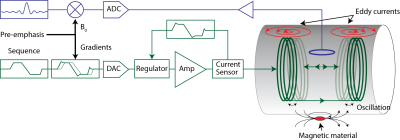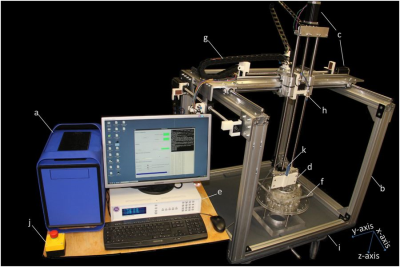Hands-On: From Ideal World to Real-World Engineering Issues
Hands-On: From Ideal World to Real-World Engineering Issues
Weekday Course
Weekday Course
ORGANIZERS: Greig Scott, Edward DiBella, Hua Guo
Tuesday, 14 May 2019
| Room 710A | 13:30 - 15:30 | Moderators: Edward DiBella, Rock Hadley |
Skill Level: Basic to Advanced
Session Number: TU-06
Overview
From pulse programming theory to the real world, which includes RF amplifier, eddy currents, gradient amplifier, and B0 and B1 hardware/measurement/correction.
Hands-on training and open-source tools with free software simulator to model the non-linearities and imperfections of MRI hardware components.
Target Audience
Basic to advanced.
Educational Objectives
As a result of attending this course, participants should be able to:
- Describe the ideal and non-ideal engineering components of an MRI system;
- Explain the idea and practice of field probes to characterize and calibrate for MRI imperfections; and
- Produce simple demonstrations using freely available MRI simulation software that models many of the scanner imperfections.
Overview
From pulse programming theory to the real world, which includes RF amplifier, eddy currents, gradient amplifier, and B0 and B1 hardware/measurement/correction.
Hands-on training and open-source tools with free software simulator to model the non-linearities and imperfections of MRI hardware components.
Target Audience
Basic to advanced.
Educational Objectives
As a result of attending this course, participants should be able to:
- Describe the ideal and non-ideal engineering components of an MRI system;
- Explain the idea and practice of field probes to characterize and calibrate for MRI imperfections; and
- Produce simple demonstrations using freely available MRI simulation software that models many of the scanner imperfections.
| 13:30 |
Introduction to MRI System Imperfections
Jason Stockmann
This talk will familiarize MRI engineers and clinicians with some of the principal limitations on MRI scanner hardware performance, along with methods for characterizing and mitigating these imperfections. We will also discuss issues arising from the interaction of the scanner's static and radiofrequency fields with the human body.
|
|
| 14:00 |
Software for Simulating MRI Systems
Tony Stöcker
The presentation will introduce computer simulations of classical MR physics, incorporating state-of-the-art MRI scanner hardware and some of their often-inevitable imperfections.
|
|
| 14:30 |
 |
Field Probes for Characterizing & Calibrating MRI Systems
David Brunner
Driving MR image acquisitions requires a level of accuracy of the dynamics of the magnetic fields that is almost impossible to achieve by design. Induced eddy currents, lead inductances, amplifier delays and other effects have hence to be corrected by feed-back, pre-distortion and post-correction schemes. All these approaches however are based on accurate characterizations of the field evolution in the scanner. In this talk, characterization methods based on field probes will be discussed along with the application of the obtained data for system calibration.
|
| 15:00 |
 |
Robotic Field Scanner
Lukas Winter
In our efforts to strengthen open source science, open source medical technology and collaboratively building an affordable open source MRI scanner, we have realized the necessity to also construct affordable and customizable open source scientific measurement equipment. Here the developments and applications of COSI Measure, a robotic field scanner with submillimeter fidelity are presented. The documentation and design files of COSI Measure are freely available and licensed under the open source hardware license CERN OHL v1.2 (www.opensourceimaging.org/cosi-measure).
|
| 15:30 |
Adjournment |
 Back to Program-at-a-Glance |
Back to Program-at-a-Glance |  Back to Top
Back to Top